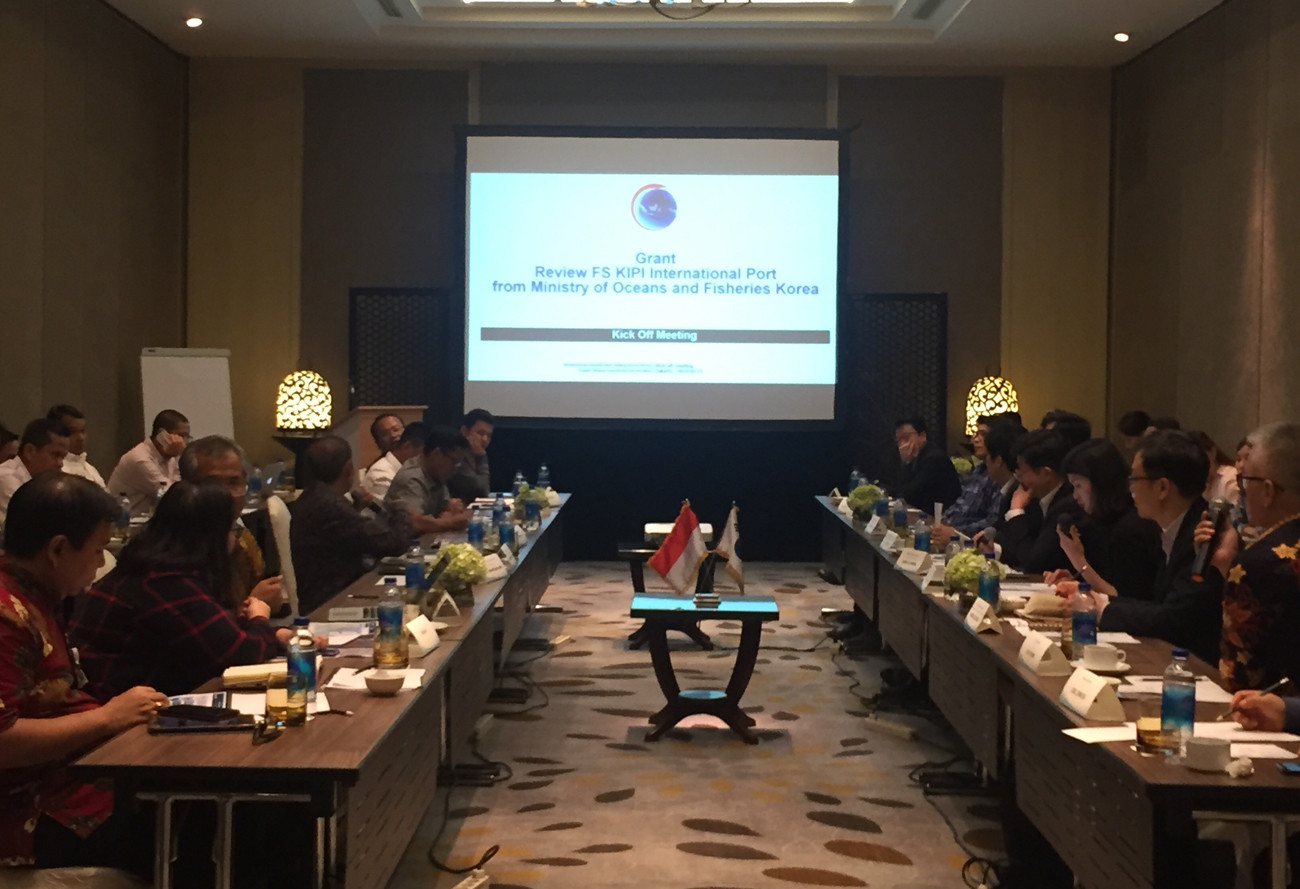Popular Reads
Top Results
Can't find what you're looking for?
View all search resultsPopular Reads
Top Results
Can't find what you're looking for?
View all search resultsGovt, South Korea kick off feasibility study for N. Kalimantan industrial zone
The South Korean government is looking to locate more of its businesses in Indonesia through a development partnership on the Tanah Kuning-Mangkupadi international port and industrial zone in North Kalimantan.
Change text size
Gift Premium Articles
to Anyone
 Government representatives Indonesia and South Korea attend on Feb. 13 a kick-off meeting on the feasibility study for North Kalimantan's Tanah Kuning-Mangkupadi international port and industrial zone development project. Korea-based company PT The South Korean government has provided a US$600,000 grant for the feasibility study. (JP/Rachmadea Aisyah)
Government representatives Indonesia and South Korea attend on Feb. 13 a kick-off meeting on the feasibility study for North Kalimantan's Tanah Kuning-Mangkupadi international port and industrial zone development project. Korea-based company PT The South Korean government has provided a US$600,000 grant for the feasibility study. (JP/Rachmadea Aisyah)
The South Korean government announced recently through its Ministry of Oceans and Fisheries that it had disbursed a US$600,000 grant for a joint feasibility study with the Indonesian government on the Tanah Kuning-Mangkupadi international port and industrial zone development proejct.
The ministry’s director for port investment cooperation, Chang Ki-Wook, said that having the South Korean government conduct the feasibility study would help ensure that South Korean companies invested in Indonesia.
“[The Indonesian government] will benefit from this grant, since all results of this international-scale, upgraded feasibility study will be handed to them,” Chang told The Jakarta Post during an exclusive interview following the kick-off meeting in Jakarta. “We hope that this will lead to a better bilateral relationship between Korea and Indonesia in the future.”
He said the study was expected to take 12 months at the longest, and that DY Engineering Co. would be representing the South Korean government.
At the same occasion, mining and energy infrastructure director Yohannes Yudi Prabangkara of the Office of the Coordinating Maritime Affairs Minister lauded the joint feasibility study, as it would help create a new economic growth center outside of Java.
“North Kalimantan is part of the Archipelagic Sea Lines of Indonesia [ALKI], so the location is very strategic for developing as a new economic center,” Yudi told the Post.
He added that the area was also ideal for mineral processing plants and smelters that production required an enormous electricity supply, since North Kalimantan was home to one of the largest hydropower sources in the country.
Yudi also said that state-owned mining holding company PT Inalum had signed up to build a smelter in the planned industrial zone.
A statement on the State-Owned Enterprises Ministry website says that Inalum plans to build an aluminum cluster with an annual production capacity of 500,000 to 1 million metric tons.
Yudi said the government had also started construction on the 9,000-megawatt Kayan hydro power plant (PLTA) near the planned industrial zone in late 2018.
Nevertheless, South Korea's PT Dragon Land, which heads a private investment consortium for North Kalimantan, said it had its own plans to build a coal-fired power plant (PLTU). The consortium is to invest $6.5 billion to develop a 5,664-hectare area that includes the power plant and a seaport in the Tanah Kuning-Mangkupadi international port and industrial zone.
Dragon Land chairman Lim Yong said the project was backed by the South Korean government, which agreed to provide the $600,000 grant to the Indonesian government for the project’s feasibility study.
“Six firms have expressed their interest as partners to invest [in the project],” Lim said after the kick-off meeting. “They come from South Korea, Japan, Australia, as well as Europe.”
Dragon Land director Santy said the project had acquired the necessary permits via the online single submission (OSS) system.
“After we complete the feasibility study and the environmental impact analysis, we need three to four years to build the seaport and less than three years for the PLTU,” she said. “Meanwhile, we will try to finish all the infrastructure for the industrial zone in under a year.”
According to the Investment Coordinating Board (BKPM), South Korea is the sixth largest foreign investor in Indonesia and booked 2,412 projects worth $1.6 billion in 2018.
During President Joko “Jokowi” Widodo’s visit to the ginseng country last September, businesses from the two countries committed about Rp 917 trillion ($6.2 billion) in investment partnerships, including Korean automaker Hyundai.









